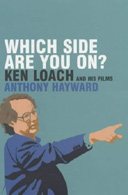
Which Side are You On? Ken Loach and his Films
by Anthony Hayward
Bloomsbury £20, pp352
Ken Loach is one of the most determinedly political film-makers in the history of cinema and certainly the most committed this country has ever seen. It is thus surprising to learn from this authorised biography how relatively late these convictions came to him. As a lower-middle-class grammar school boy in Nuneaton, the only child of a self-educated father who left the mines for a job in light industry, he did not stand on street corners selling Trotskyist newspapers. As a national serviceman in the RAF he did not smart under the discipline or attempt to politicise his fellow clerks. Arriving in Oxford in 1957 just after the Hungarian revolution and the Suez fiasco he did not join any political club.
In fact, from his earliest days his passion was for the stage, which embraced equally the classical theatre of Stratford-upon-Avon, the star-studded commercial theatre, the music hall, amateur dramatics and student productions. It was only in the 1960s when he took a BBC directors' course and began to work in television drama that he moved to the left, joining the Labour Party in 1964 just prior to Harold Wilson's arrival in Downing Street. Thirty years later he resigned in disgust.
His conversion, if not exactly Damascene in its suddenness, was complete and enduring. Under the influence of socialist friends such as the producers Roger Smith and Tony Garnett, the theatrical practice of the Royal Court, Joan Littlewood's Theatre Workshop, Bertolt Brecht, and the French New Wave (especially Jean-Luc Godard), he forged a new kind of social realist style in a mode that mixed fiction and documentary. These years were the golden age of British TV drama and Loach rapidly became one of its leaders, achieving national fame with Cathy Come Home which awakened the nation to the plight of the homeless, and Up the Junction which took a fresh, unpatronising view of the stunted lives of young working-class women.
From this point Loach's life was almost entirely consumed by his work for television and the cinema, and that work is all of a piece in its devotion to his assaults on the exploitation of the working classes under capitalism, and the way they're constantly betrayed by their own leaders, be they trade union officials, Labour Party functionaries or Stalinist commissars. Of his personal life we learn little other than that he has been happily married since 1962 and was a loving father when at home. 'I don't think he will ever stop working - he is his work,' says his wife, Lesley, who devoted herself to raising five children (one of whom was killed along with Lesley's grandmother in a tragic road accident in which both Lesley and Ken were badly injured).
The picture of Loach that emerges from this book is of a mild, quietly spoken man, who never shouts 'action' or 'cut', but has a steely will and an utter determination to plough his own straight fearless furrow, whatever rocks he runs into. Hayward is particularly good on conflicts with authority and steers us lucidly through the labyrinthine disputes resulting from his contentious political TV documentaries of the 1980s.
Loach's dedication to realism knows no bounds. To attain spontaneity he is prepared to shock his actors, and even cause them pain. In Kes, the six boys sent to see the headmaster didn't know they were going to get a real caning, and one didn't know he was going to be punished at all. He likes to work where possible with non-professional actors, but behind the camera he has chosen to work again and again with compatible writers, producers, cinematographers and editors, who must share his political views.
His quest is for truth, for revealing society's hidden agendas, for giving a voice to the insulted and injured. If his oeuvre has an admirable consistency of vision, there is also a certain narrowness in his near inability to see merit or morality outside the working classes, or to recognise virtue in films other than his own. I was once on a prize-jury with him and in ridiculing my claims on behalf of Rappeneau's Cyrano de Bergerac, Loach gave a satiric impersonation of the movie's fustian style that resembled Debbie Reynolds's comic dismissal of silent-movie acting in Singin' in the Rain. But in rejecting an offer to work in America he recognised his chosen limitations: 'I'd find it difficult to work in an environment and idiom where I don't feel at home.'
One of my favourite Loach scenes occurs in his masterly The Price of Coal when a pompous colliery official waiting in line for a royal visit has his hairpiece blown off by Prince Charles's helicopter. This was something Loach had wanted to do for years, and according to Tony Garnett arose from a long-standing obsession with wigs and hairpieces that clearly reflects his dislike of falsity and artifice. 'If you've got a trained eye you can spot one a mile off,' Loach told his biographer.

